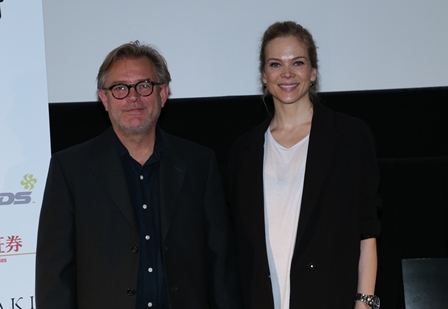
During the press conference for Bent Hamer’s quietly affecting Competition entry, “1001 Grams,” a journalist wondered if the director wanted to portray his fellow Norwegians as being somehow “characteristically lonely” in comparison to other nationalities. Hamer admitted that many of his protagonists are loners, but seemed to indicate that they weren’t so much indicative of a national character as of his own personallity.
Granted, in the past, the lead characters in Hamer’s films were male, while in this case it is a woman, Marie (Ane Dahl Torp), a scientific researcher who is entrusted with her country’s one-kilogram prototype to present at a European standards conference when her father, who usually attends to such matters, dies unexpectedly. Like the ingot, Marie is somewhat solitary in her uniqueness, and her father’s illness and subsequent death takes her by surprise, so much so that the responsibility of confirming her country’s mass standard literally weighs heavy on her soul. However, she is fortunate to accidentally meet a kindred type in Pi (Laurent Stocker) who not only commiserates with her loneliness, but addresses it with his own unique research field. The two essentially come together over the subject of specificity.
Hamer couldn’t properly answer which came first, the issue of the weight standard or Marie’s crisis of loneliness. “While working out the script, it just hit me,” he said, thus making a case for the creative process as something that is constantly evolving. His main idea was that the kilogram as presented in the movie is something that’s “universal” and so Marie’s personal plight is also something that everyone can identify with. In the end, when Marie takes her father’s ashes and weighs them she watches the scale slowly adjust itself to 1001 grams, as if his soul were leaving his physical remains behind.
“Bent has a very special place in European cinema,” Torp said during the press conference. “When I worked with other European actors they professed admiration, saying they would love to work with him.” What they, and Torp herself, admire is Hamer’s “precision.” She described how personally she has a tendency to smile, a penchant she had to repress while playing Marie, because when Marie does smile, “it represents a kind of breakthrough, she comes alive.” Likewise, the way the character walks down corridors “slowly” was something she had to “learn” in Hamer’s world.
Hamer admitted that this was the first time he had dealt with a female protagonist and that it was his wife who suggested Torp. The two women once shared a cap some years ago and the actress thought the director needed to add a feminine touch. “Why can’t we have a female protagonist?” she thought. She got her wish, and the result is one of the most moving portrayals of female solitude in movies.
























